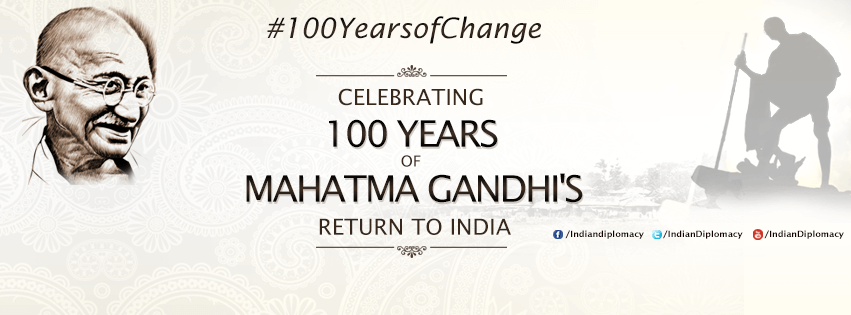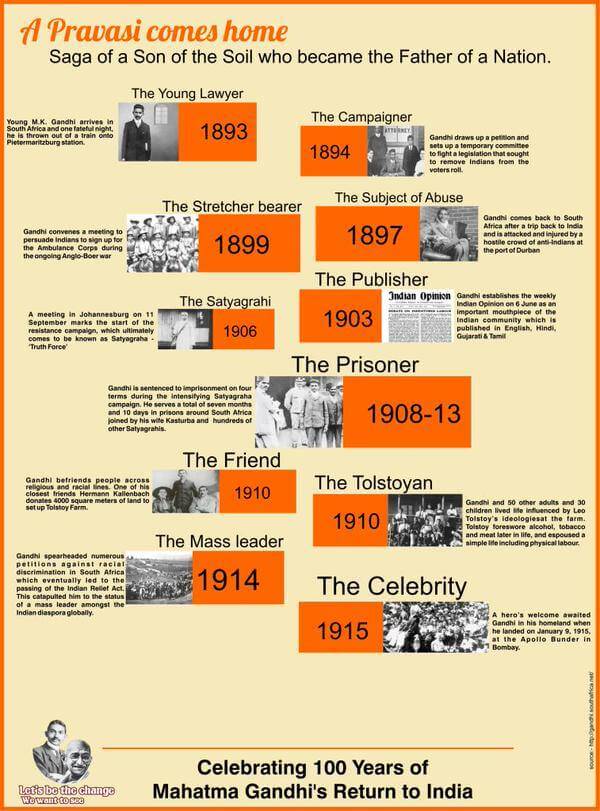Info
Celebrating a Century of Mahatma Gandhi’s Return to India – 9th Jan 2015

(Source: Shree Pretoria Hindu Seva Samaj)
October 2, 1869: ·Birth of Mohandas Karamchand Gandhi
1883: ·Gandhi and Kasturbai are married.
1885: ·Death of Karamchand Gandhi, Gandhi’s father
September 4, 1888: ·Gandhi leaves for England to study law.
June 10, 1891: ·Gandhi passes the bar exam in England.
1891-1893: ·Gandhi fails to progress as a lawyer in India.
April 1893: ·Gandhi accepts commission to spend a year in South Africa advising on a lawsuit.
Spring 1894: ·Gandhi elects to stay on in South Africa in response to plea by Indian merchants to fight against discriminatory legislation, and founds the Natal Indian Congress.
Spring 1896: ·Gandhi returns to India to collect his wife and children.
December 1896: ·Gandhi returns to South Africa with his family.
October 1899: ·Outbreak of Boer War (1899-1901) in South Africa. Gandhi organizes an ambulance corps for the British.
1901: ·Gandhi returns to India to attend the Indian National Congress. G.K. Gokhale introduces him to nationalist leaders.
1904: ·Nationalists found the magazine the Indian Opinion, and soon print it on Gandhi’s farm, the “Phoenix Settlement.”
July 31, 1907: ·The Boer Republic Transvaal, now under the control of the British, attempts to register all Indians as members; Gandhi and others refuse to register. Their resistance efforts mark the first use of nonviolent non-cooperation by the Indian minority in South Africa, soon called satyagraha, or “soul-force.”
January 11, 1908: ·Gandhi is arrested and sentenced to two months in prison.
October 10, 1908: ·Gandhi is arrested again, spends a month in jail.
1909: ·Gandhi travels to London, pushing for rights of South African Indians. The Transvaal registration law is repealed.
November 13, 1913: ·Indians in Natal and Transvaal, under Gandhi’s leadership, march peacefully in protest of a racist poll tax and marriage laws. The marches continue through the winter.
June 30, 1914: ·Gandhi and Smuts, the Prime Minister of the Transvaal, reach an agreement, ending the protests.
July 18, 1914: ·Gandhi sails to England.
August 1914: ·Gandhi arrives in England, just at the outbreak of World War I (1914-1918).
January 9, 1915: ·Gandhi returns home to India, and receives a hero’s welcome.
2015: Message of India’s Prime Minister Narendra Modi on the auspicious occasion of 100 years of Change – 100 years of Mahatma Gandhi’s Return to India, to the Indian Diaspora around the world.
1) You have put India on the world map. Now India awaits you with several opportunities.
2) The Indian community is admired around the world not due to money, but the values that the community lives by.
3) Be it the most developed nation or the poorest one, all of them look towards India. The world understands India’s potential.
4) I know the problems you faced. That’s why visa on arrival facilities are being made available for several nations.
5) Everything is not measured in dollars/pounds. The relationship we have with Pravasis is beyond that. It’s a bond.
How Mahatma Gandhi affected/took part in the SA’s history
Opposition to Apartheid
The return of an Afrikaner-led National Party government by the overwhelmingly white electorate in 1948 signalled the advent of the policy of Apartheid. During the 1950s, non-whites were removed from electoral rolls, residence and mobility laws were tightened and political activities restricted.
The successful increase of awareness outside of South Africa achieved in the Indians’ movement under the leadership of Gandhi inspired blacks in South Africa to resist the racism and inequality that they, and all other non-whites, were experiencing. The two racial groups began working together, forcing themselves to accept one another and bash their own personal prejudices against one another. This required effort: education supporting the other race and their achievements, and constantly reminding themselves that they needed one another to combat the oppression they were facing. They began collaborating, even jointly campaigning for their struggle to be managed by the United Nations (although in this time, western society was not practicing equality for all people either).
The ANC also found its role model in the initial movement by the Indian political parties. They realized that they would need a fervent leader, like Gandhi was for the Indians, who was, in the words of Nelson Mandela, “willing to violate the law and if necessary go to prison for their beliefs as Gandhi had”. In 1949 the ANC saw a jump in their membership, which previously lingered around five-thousand, and began to establish a firm presence in South African national society.
In June 1952, the ANC joined with other anti-Apartheid organizations in a Defiance Campaign against the restriction of political, labour and residential rights, during which protesters deliberately violated oppressive laws, following the example of Mahatma Gandhi‘s passive resistance in KwaZulu–Natal and in India. The campaign was called off in April 1953 after new laws prohibiting protest meetings were passed.
Violent political resistance
Following the Sharpeville massacre in 1960, the ANC leadership concluded that the methods of non-violence such as those utilized by Gandhi against the British Empire during their colonization of India were not suitable against the Apartheid system. A military wing was formed in 1961, called Umkhonto we Sizwe (MK), meaning “Spear of the Nation”, with Mandela as its first leader. MK operations during the 1960’s primarily involved targeting and sabotaging government facilities. Mandela was arrested in 1962, convicted of sabotage in 1964 and sentenced to life imprisonment on Robben Island, along with Sisulu and other ANC leaders after the Rivonia Trial.

